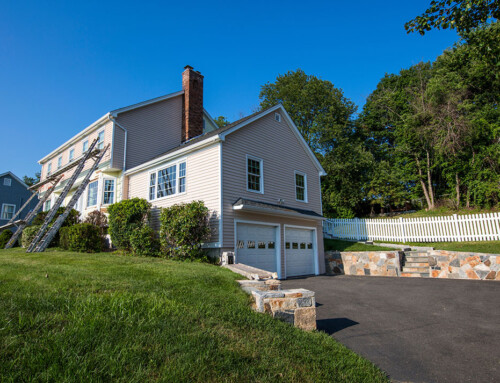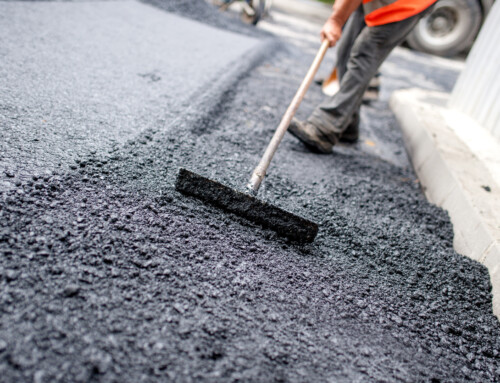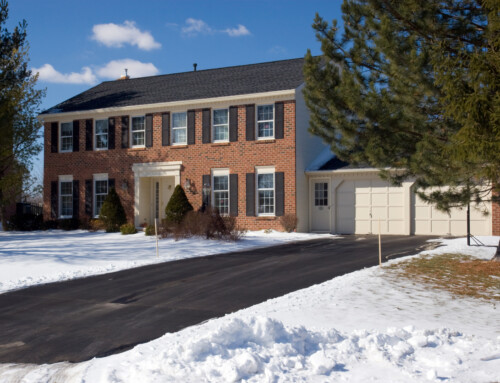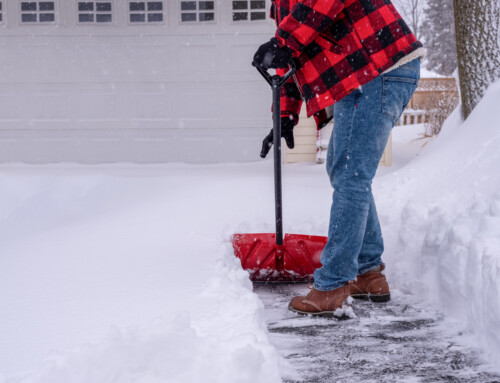Freezing, wet weather can have a dramatic impact on asphalt driveways, roads, parking lots, and other surfaces. Without proper planning and maintenance, your asphalt can easily fall victim to Canada’s winters, dramatically shortening its useful life. Fortunately, understanding how winter weather can affect asphalt, and making a proactive plan ahead of time, can help to ensure that your asphalt survives even our most challenging winter conditions. Here is what you need to know.
Asphalt Winter Maintenance and Repair Tips

Asphalt Installation
Asphalt should never be installed during the winter months, due to the nature of the installation process, as well as the internal makeup of the asphalt product. Hot asphalt arrives at the job site on a heated truck. It is maintained at a high temperature that keeps it well-mixed, liquid, and ready to pour. It is then poured onto the prepared site, where it is spread and evenly leveled off. The asphalt is then left to harden over the next 24 hours, and to cure for approximately a week.
In cold weather, the asphalt begins to harden too rapidly. There is not enough working time to properly pour, spread, and level off the asphalt before it becomes too thick to work with. In addition, the frozen ground can cause the aggregates that form part of the asphalt mix to loosen and even break free.
Cracked Asphalt
Even the best laid asphalt is not immune to cracking during winter weather. This is because the ground actually expands and contracts as it freezes and thaws. Especially during times of heavy snowfall and snow melt, the expansion and contraction is simply too much for the asphalt to absorb, leading to ongoing cracking.
Water Intrusion
Water intrusion is a constant concern with asphalt, whether during heavy summer rains or winter snowfalls. As cracks form on the surface, water is able to penetrate into the lower levels of the asphalt. This can lead to asphalt erosion from within, ultimately resulting in deepening cracks, potholes, and even total asphalt failure.
Cold Patching Asphalt
Because asphalt cracks tend to lead to worsening problems over time, it is very important to patch them as soon as possible. Major repairs need to wait until spring, but cold patching, which is not dependent on the ambient temperature of the air or the ground, is an effective temporary solution. Patch small cracks or new potholes when you notice them, and plan to have a more permanent repair performed when the temperature warms up.
Asphalt Seal Coating
One of the best defenses against winter weather damage to asphalt is seal coating. Before the temperature begins to drop, ask your asphalt professional to apply a seal coat. This thin layer of protective material helps to repel moisture, as well as gasoline, oil, and other chemicals that can damage the asphalt. Be sure to have the seal coat inspected annually, and reapplied every two to three years as needed.
Asphalt Repair
If your asphalt takes damage over the winter, it may be salvageable in the spring. Minor to moderate damage is normally fixed with a process known as surface patching. A few inches of asphalt are milled off the top of the damaged section, the hole is cleaned out, and new asphalt is poured and leveled off.
If the damage is severe, dig-out patching is the usual solution. The entire section of failed asphalt is removed and replaced. This is a pricey and time-consuming solution, but is much less expensive than replacing the entire area.
If the damage is extensive, resurfacing might be the best choice. The top layers of the entire piece of asphalt are removed, any needed structural repairs are completed, and then the top layers are replaced with fresh asphalt. This can dramatically boost the strength and stability of badly damaged asphalt while restoring curb appeal.
Of course, sometimes asphalt is simply too far gone to be salvaged, and it must be replaced. However, it is not easy for the untrained eye to assess. At TopWest Asphalt, we are always happy to give you our professional opinion on how to proceed.
Based in Abbotsford, Topwest Asphalt also serves Langley, Chilliwack, Mission, and Maple Ridge. Are you ready to start your next asphalt project with a team you can count on to do the job right, on time, and on budget? We invite you to call Topwest Asphalt today at 1-800-ASPHALT to discuss your project and schedule an estimate. We look forward to working with you!





